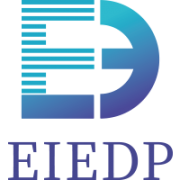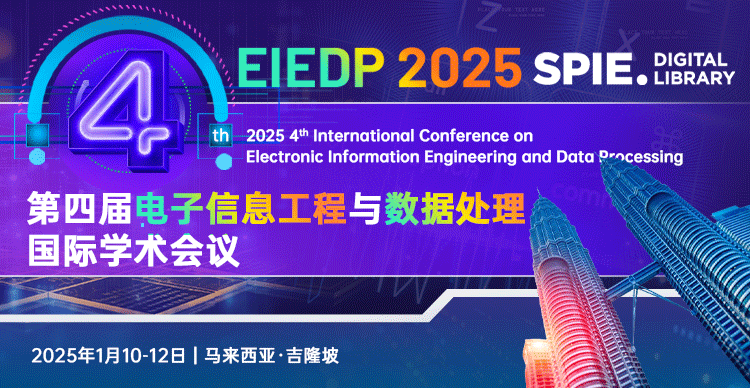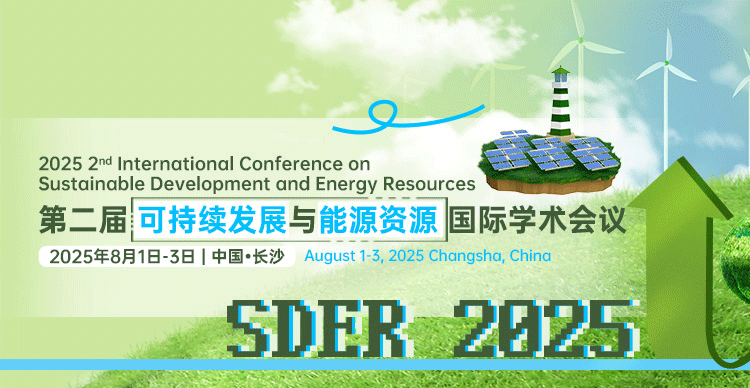第四届电子信息工程与数据处理国际学术会议
2025 4th International Conference on Electronic Information Engineering and Data Processing
会议介绍
第四届电子信息工程与数据处理国际学术会议(EIEDP 2025)将于2025年1月10-12日在马来西亚首都吉隆坡举办。EIEDP 2025聚焦于电子信息技术的最新进展、大数据处理的创新方法、人工智能应用的深入探索、以及物联网技术的前沿趋势,旨在为全球电子信息工程与数据处理领域的专业人士搭建一个高端交流平台。会议将汇集来自世界各地的顶尖学者、行业领导者、研究人员与工程师,共同分享研究成果、交流实践经验、探讨未来挑战与机遇。会议特色拟定包括主题演讲、分论坛报告、以及口头和海报展示,为参会者提供全方位、深层次的学术交流体验。我们特别邀请了多位国际知名专家进行特邀报告,分享他们在各自研究领域的深刻洞察与独到见解。
此外,吉隆坡作为东南亚的文化交汇点,其多元化的城市风貌与热情友好的氛围,将为与会者提供一个难忘的国际化学术之旅。我们热切期待您的参与,共同推动电子信息工程与数据处理领域的边界,促进全球科技合作与创新。敬请关注EIEDP 2025官方网站获取最新会议动态、注册信息及投稿指南。期待在吉隆坡与您相见,共襄学术盛举!
组织单位
主办单位
Universiti Malaya
支持单位
华南理工大学
电子与信息学院
华南理工大学
未来技术学院
中新国际联合研究院
新加坡机器人学专业协会
报告嘉宾
Assoc. Prof. Por Lip Yee
IEEE Senior Member
University of Malaya,
Malaysia
Assoc. Prof. Rajamohan Parthasarathy
SEGI University,
Malaysia
Prof. Haw Su Cheng
Multimedia University,
Malaysia
Assoc. Prof. Pavel Loskot
IEEE Senior Member
Zhejiang University-University of Illinois at Urbana-Champaign
Institute (ZJUI), China
征稿主题
计算机科学
算法
计算机网络
计算机软件
计算伦理
计算机模拟
神经网络
计算机安全
图像处理
计算机视觉
数据压缩
数据挖掘技术
人工智能
人工智能算法
自然语言处理
模糊逻辑
计算机视觉与图像理解
信号和图像处理
语音与自然语言处理
计算学习理论
信息检索与融合
生物信息学
移动计算机处理技术
其他相关主题
电子信息工程
电力电子技术
通信信号处理
数字信号处理
微波技术与天线
电磁场与电磁波
信号与图像处理
自动控制和智能控制
计算机与网络技术
网络与办公自动化技术
多媒体技术
单片机技术
电子系统设计工艺
电子设计自动化(EDA)技术
其他相关主题
数据处理
数据挖掘
大数据技术与应用
大数据运维
数学与应用科学
信息与计算科学
计算机科学
数据科学与大数据技术
控制科学
系统科学
物联网
计算机控制技术
其他相关主题
* 其他相关主题均可
会议历史
会议往届均已实现EI和Scopus双检索,点击图片可查看详情
*EIEDP 2024(独立出版)-会后5个月检索:ISBN: 978-1-5106-8053-1
*EIEDP 2023(独立出版)-会后3.5个月检索:ISBN: 978-1-5106-6616-0
*EIEDP 2022(合并至CIBDA 2022出版)-会后6个月检索:ISBN: 978-3-800-75876-0
EI会议论文集征稿
EIEDP 2025所有的投稿都必须经过2-3位组委会专家审稿,经过严格的审稿之后,会议所录用论文将以论文集的形式交由SPIE - The International Society for Optical Engineering (ISSN: 0277-786X)出版,出版后提交 EI Compendex, Scopus检索。
注:
1、会议仅接受全英稿件。
2、论文应具有学术或实用价值,未在国内外学术期刊或会议发表过。发表论文的作者需提交全文进行同行评审,只做报告不发表论文的作者只需提交摘要。
3、作者可通过CrossCheck, Turnitin, iThenticate或其他查重系统自费查重,否则由文章重复率引起的被拒搞将由作者自行承担责任。涉嫌抄袭的论文将不被出版,且公布在会议主页。
4、论文需按照会议官网的模板排版,EI会议稿件排版后不得少于4页;SCI期刊稿件排版后不得少于8页。仅接受全英投稿。
About EIEDP 2025
Welcome to the official website of 2025 4th International Conference on Electronic Information Engineering and Data Processing (EIEDP 2025).
2025 4th International Conference on Electronic Information Engineering and Data Processing(EIEDP 2025) will be held on January 10-12 2025 in Kuala Lumpur Malaysia. EIEDP 2025 is to bring together innovative academics and industrial experts in the field of Electronic Information Engineering and Data Processing to a common forum. The primary goal of the conference is to promote research and developmental activities in Electronic Information Engineering and Data Processing and another goal is to promote scientific information interchange between researchers developers engineers students and practitioners working all around the world. The conference will be held every year to make it an ideal platform for people to share views and experiences in electronic information engineering and data processing and related areas. We warmly invite you to participate in EIEDP 2025.
Important Dates
Full Paper Submission Date
November 10 2024
Registration Deadline
December 1 2024
Final Paper Submission Date
December 10 2024
Conference Dates
January 10-12 2025
Speakers
Assoc. Prof. Rajamohan Parthasarathy
SEGI University Malaysia
Biography:ASSO. PROF. TS. DR. P. RAJAMOHAN received his Bachelor of Science Degree (B.Sc) in Physics later he obtained his Post Graduate Diploma in Computer Applications (PGDCA) Master Degree in Computer Applications (MCA) Master of Technology in Computer Science Engineering (MTech) Doctoral in Philosophy (PhD) in Computer Science Chartered Engineer (C.Eng.) ti
ti
Abstract: The world is rapidly changing i.e. developing in a technological sense and is being driven by the present economic system globally. Unfortunately each technological development has got its price which can be sensed through the intense utilization of limited fossil-ba
Prof. Haw Su Cheng
Multimedia University Malaysia
Biography:Su-Cheng Haw is Professor at Faculty of Computing and Informatics Multimedia University where she leads several funded research on the xm
ti
Abstract:Recommender system has been useful to filter the information to search for shopper needs and most wanted items efficiently and relevantly. E-commerce website such as Amazon and Netflix have been using recommender system to build and boost their sales through the personalization recommendation. In addition it is crucial that a Recommender System is able to provide an unified approach to visualize the interactions level of data i.e. filter out the unnecessary and provides the most relevant processed data for decision making purpose. In this talk some existing recommender system will be discussed focusing in retailer and e-commerce domain. In addition possible research directions will be discussed ba
Assoc. Prof. Pavel Loskot IEEE Senior Member
Zhejiang University-University of Illinois at Urbana-Champaign Institute (ZJUI) China
Biography:Pavel Loskot joined the ZJU-UIUC Institute in January 2021 as the Associate Professor after being nearly 14 years with Swansea University in the UK. He received his PhD degree in Wireless Communications from the University of Alberta in Canada and the MSc and BSc degrees in Radioelectronics and Biomedical Electronics respectively from the Czech Technical University of Prague in the Czech Republic. He is the Senior Member of the IEEE Fellow of the Higher Education Academy in the UK and the Recognized Research Supervisor of the UK Council for Graduate Education. His current research interest focuses on problems involving statistical signal processing and importing methods from Telecommunication Engineering and Computer Science to other disciplines in order to improve the efficiency and the information power of system modeling and analysis.
ti
Abstract: Many practical problems involve non-linear multivariate models with random signal inputs. This not only makes the analysis often to be mathematically intractable but also requires implementing non-linear signal processing methods which can easily become non-trivial. The basic strategy to deal with non-linearities is to linearize or otherwise approximate the non-linearity and to decompose high-dimensional non-linear systems into interrelated lower-dimensional components. In this talk I will review the most common strategies that are used to process non-linear random signals and to design non-linear signal processing which cannot be avoided in some applications.
Call For Papers
The topics of interest for submission include but are not limited to:
Computer Science
Algorithm
Mathematics and Applied Science
Artificial intelligence
Computer vision
Computer security
Computer network
Computer simulation
Digital signal and image processing
Digital system and logic design
Multimedia applications
Computer Control Technology
Electronic Information Engineering
Power electronic technology
Communication signal processing
Digital signal processing
Microwave technology and antenna
Electromagnetic field and electromagnetic wave
Signal and image processing
Automatic control and intelligent control
Single chip microcomputer technology
Electronic system design process
Electronic design automation (EDA) technology
Digital signal processing
Data Processing
Data Mining
Big Data Technology and Applications
Big Data Operations and Maintenance
Automation software engineering
Information and Computational Science
Information system
Data Science and Big Data Technology
Knowledge data engineering
Internet of Things
Publication
All papers submitted to EIEDP 2025 will be reviewed by two or three expert reviewers from the conference committees. After a careful reviewing process all accepted papers will bepublished inSPIE - The International Society for Optical Engineering (ISSN: 0277-786X) and submitted to EI Compendex Scopus for indexing.
Note: All submitted articles should report original results experimental or theoretical not previously published or being under consideration for publication elsewhere. Articles submitted to the conference should meet these criteria. We firmly believe that ethical conduct is the most essential virtue of any academic. Hence any act of plagiarism or other misconduct is totally unacceptable and cannot be tolerated.







